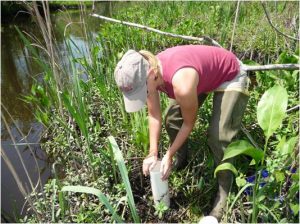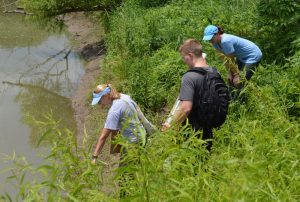
Collecting soils from a suburban tidal creek (Jacksonville, FL) to test the effects of stormwater pulses on soil carbon dynamics.
As the human population grows, human interactions with the natural environment become more common. While significant research is done to understand the negative impacts of humans (e.g., habitat loss, pollution), it is also important to recognize and study beneficial interactions between humans and the natural world, such as restoration activities. Our work at the anthropogenic ecotone addresses: 1) how the juxtaposition of human development and natural areas affects ecological processes, and 2) how human-driven restoration activities can directly or indirectly affect biogeochemistry. Past research in this area includes: understanding how stormwater discharge from coastal communities impacts salt marsh resilience and function; quantifying microplastics in the Mississippi River watershed; and evaluating the consequences of winter road salt application on soil ecology.
Currently, we are working with collaborators from the US Army Corps of Engineers to understand how to use dredge material from navigation channels to improve the resilience of coastal wetlands and store more carbon in the soil. We are also evaluating various “eco-friendly” coastal restoration materials to better understand how biodegradable and non-plastic substances affect biogeochemical properties and processes in coastal ecosystems.

Investigating changes in the riparian corridor as the result of upstream dam construction.
Current Funding:
2023-2027- US Department of Agriculture, National Institute of Food and Agriculture- Utilizing Fine Sediment Amendment to Enhance the Health and Resilience of Cultivated Histosols.Co-PIs: J.H. Bhadha (UF), J. Hu (MSU), D. Miles (ARF)
2021-2024- US Army Corps of Engineers- Evaluating Mineral Associated Blue Carbon Accumulation in Coastal Wetlands
Past Funding:
2016-2017- National Oceanic and Atmospheric Association, Marine Debris Program- Quantifying and Characterizing the Mississippi River’s Contribution of Microplastic Debris to the Gulf of Mexico. PI: J.L. Conkle; co-PIs: E.A. Hasenmuller, L.G. Chambers, J.R. White
2014-2015- Saint Louis University, Presidential Research Fund- Identification of Regional Sites, Data Sources, and Collaborations to Support Studies of Sustainable River-Reservoir Systems. PI: A.L. Cox; Co-PI: L.G. Chambers and D.M. Hanes
2011-2012- Florida Sea Grant, Nutrient Dynamics Graduate Research Grant – Urban Stormwater, Carbon Cycling, and Sea Level Rise
